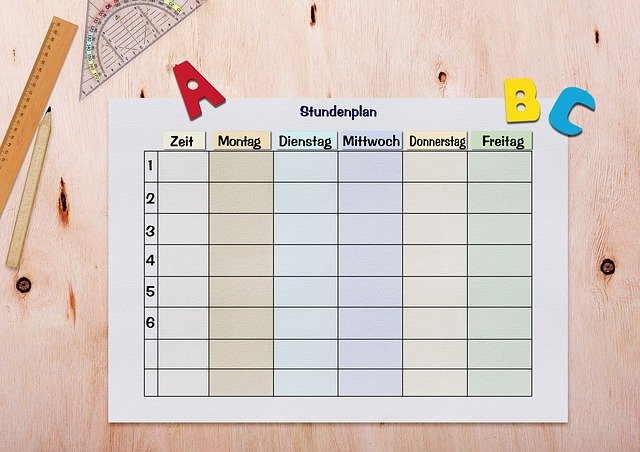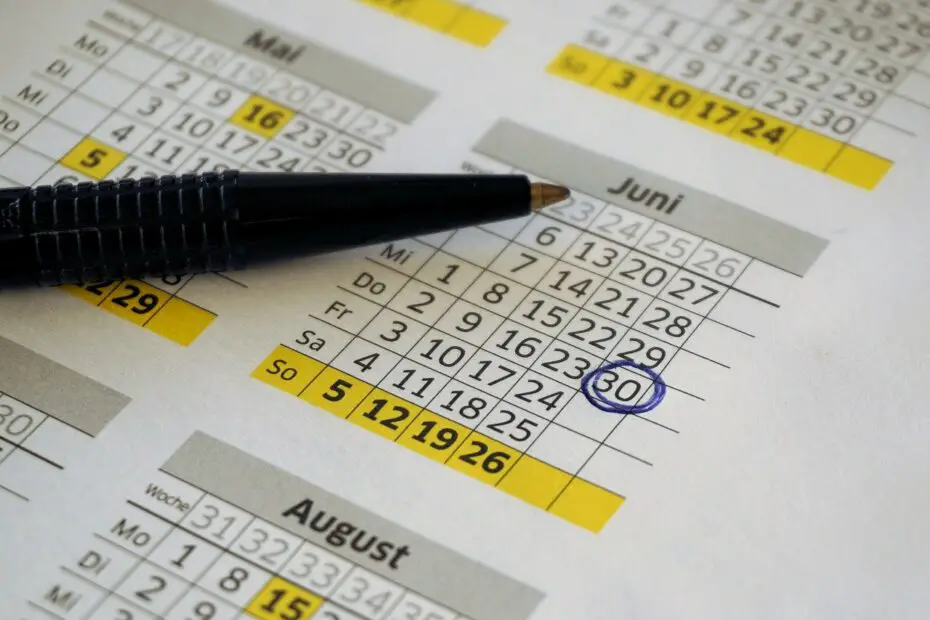Calendar related dates are always among the first things to learn in a new language. They are important to make appointments, or mark special dates such as weekends, birthdays or public holidays. So today we are going to look at the names of the seasons, months and weekdays in German.
Most of the old germanic names for months and weekdays were introduced into the English language by the Anglo-Saxons ruling in England from about 500 AD until 1066. So you shouldn’t have problems remembering the names, although the pronunciation is usually different.
Seasons In German
Germany has a temperate climate with four seasons. In the North German lowlands and on the North Sea and Baltic Sea, summers are pleasantly warm and winters are not too cold. Further south and east, the temperature differences between the seasons are sometimes significantly greater. The lowest temperatures are usually measured in January. The warmest time is from June to September, with monthly average temperatures of 21 to 25 degrees Celsius (69 to 77 Fahrenheit).
The four seasons in Germany are
Frühling – Spring
Sommer – Summer
Herbst – Autumn
Winter – Winter
Months in German
| English | German | |
| 1 | January | Januar |
| 2 | February | Februar |
| 3 | March | März |
| 4 | April | April |
| 5 | May | Mai |
| 6 | June | Juni (Juno) |
| 7 | July | Juli |
| 8 | August | August |
| 9 | September | September |
| 10 | October | Oktober |
| 11 | November | November |
| 12 | December | Dezember |
Please note that “Juni” is sometimes also called “Juno”, especially in verbal communication. That’s done because “Juni” and “Juli” sound pretty similar, so it helps to clarify which month you are referring to.
Weekdays in German

Weekday in German is “Wochentag”. It’s a masculine word, so it is “der Wochentag”. The plural form is “die Wochentage”.
Working days are called “Werktage” (labour days) and this officially includes the Saturday. But Offices, banks and council authorities are usually closed on Saturdays. Some shops and post offices (especially in rural areas) are only open until lunch time on Saturdays. Supermarkets in big cities are open until late, even on a Saturday.
The weekend translates literally as “Wochenende” (neuter) and for most people includes the Saturday. So the Saturday can be seen as both, a working day or part of the weekend.
So let’s take a look at the days of the week in German.
| English | German |
| Monday | Montag |
| Tuesday | Dienstag |
| Wednesday | Mittwoch |
| Thursday | Donnerstag |
| Friday | Freitag |
| Saturday | Samstag, Sonnabend |
| Sunday | Sonntag |
Like the old Romans the Germans named the weekdays after their gods. Of course they replaced the names of the Roman gods. so most of the German weekdays have names referring to ancient Germanic or nordic gods. When Christian priests introduced the Christian faith in Germany, they didn’t really appreciate this form of reference to heathen gods and managed to change the names of at least two weekdays.
Montag – refers to the nordic god Máni, the god of the moon
Dienstag – a reference to the old nordic god Tyr, the god of battle and war
Mittwoch – originally named after the god Wodan (or Odin in nordic mythology), which still shows in the English name “Wednesday”. But in the 10th century Christian priests and missionaries managed to change its name to Mittwoch, meaning middle of the week.
Donnerstag – literally “thunder day” in reference to Thor, son of Odin, and the god of thunder. He is a mighty warrior and his main weapon is the hammer “Mjölnir”
Freitag – named after Friya or Frigg, the wife of Odin and goddess of life, matrimony, and motherhood
Saturday – the second of the weekdays in German renamed for religious reasons. Originally named “Satertag” the catholic church used “Samstag” as reference to the Jewish “sabbath”, in jewish and early christian tradition the first day of the week.
As people in the north and east of Germany are usually protestant, not catholic, they use the expression “Sonnabend” instead. Originally it meant the evening before Sunday, but later meant the whole day.
But as weekdays are abbreviated with their first two letters, the expression “Samstag” is becoming more popular even in protestant areas. So the abbreviated weekdays in German are Mo, Di, Mi, Do, Fr, Sa, So. If you abbreviated Sonnabend,it would become So and couldn’t be distinguished from So for Sonntag.
Sunday – again a literal translation, “Sonntag” means the day of the sun, just as in English




